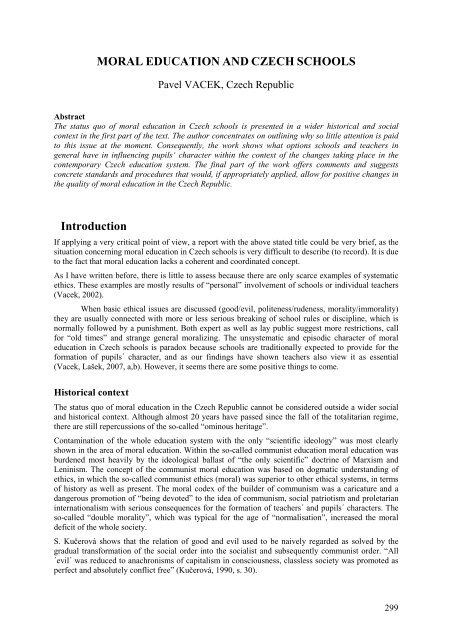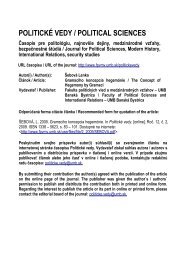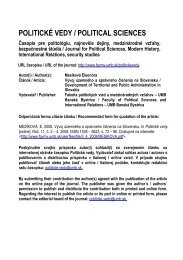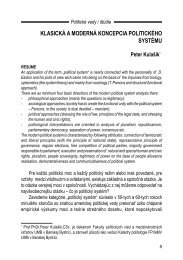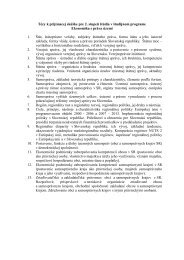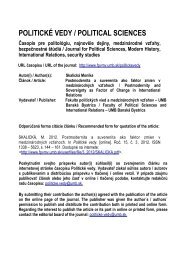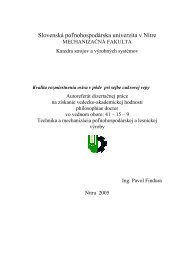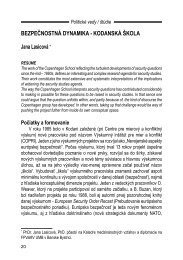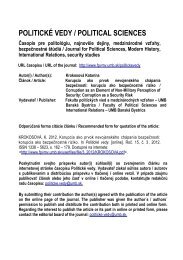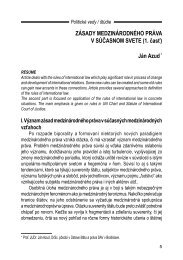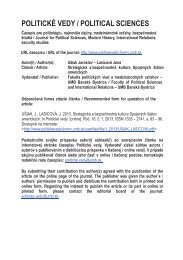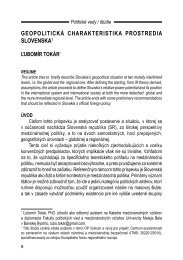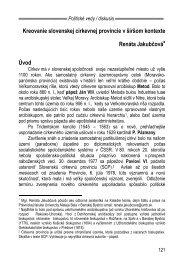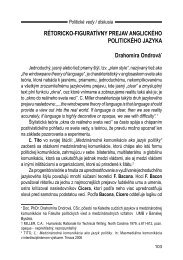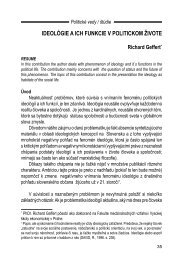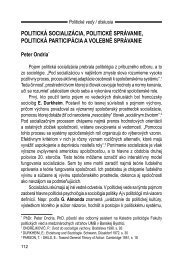MRAVNÃ VÃCHOVA V Å KOLÃCH NA SLOVENSKU A V ZAHRANI ÄÃ
MRAVNÃ VÃCHOVA V Å KOLÃCH NA SLOVENSKU A V ZAHRANI ÄÃ
MRAVNÃ VÃCHOVA V Å KOLÃCH NA SLOVENSKU A V ZAHRANI ÄÃ
You also want an ePaper? Increase the reach of your titles
YUMPU automatically turns print PDFs into web optimized ePapers that Google loves.
MORAL EDUCATION AND CZECH SCHOOLS<br />
Pavel VACEK, Czech Republic<br />
Abstract<br />
The status quo of moral education in Czech schools is presented in a wider historical and social<br />
context in the first part of the text. The author concentrates on outlining why so little attention is paid<br />
to this issue at the moment. Consequently, the work shows what options schools and teachers in<br />
general have in influencing pupils‘ character within the context of the changes taking place in the<br />
contemporary Czech education system. The final part of the work offers comments and suggests<br />
concrete standards and procedures that would, if appropriately applied, allow for positive changes in<br />
the quality of moral education in the Czech Republic.<br />
Introduction<br />
If applying a very critical point of view, a report with the above stated title could be very brief, as the<br />
situation concerning moral education in Czech schools is very difficult to describe (to record). It is due<br />
to the fact that moral education lacks a coherent and coordinated concept.<br />
As I have written before, there is little to assess because there are only scarce examples of systematic<br />
ethics. These examples are mostly results of “personal” involvement of schools or individual teachers<br />
(Vacek, 2002).<br />
When basic ethical issues are discussed (good/evil, politeness/rudeness, morality/immorality)<br />
they are usually connected with more or less serious breaking of school rules or discipline, which is<br />
normally followed by a punishment. Both expert as well as lay public suggest more restrictions, call<br />
for “old times” and strange general moralizing. The unsystematic and episodic character of moral<br />
education in Czech schools is paradox because schools are traditionally expected to provide for the<br />
formation of pupils´ character, and as our findings have shown teachers also view it as essential<br />
(Vacek, Lašek, 2007, a,b). However, it seems there are some positive things to come.<br />
Historical context<br />
The status quo of moral education in the Czech Republic cannot be considered outside a wider social<br />
and historical context. Although almost 20 years have passed since the fall of the totalitarian regime,<br />
there are still repercussions of the so-called “ominous heritage”.<br />
Contamination of the whole education system with the only “scientific ideology” was most clearly<br />
shown in the area of moral education. Within the so-called communist education moral education was<br />
burdened most heavily by the ideological ballast of “the only scientific” doctrine of Marxism and<br />
Leninism. The concept of the communist moral education was based on dogmatic understanding of<br />
ethics, in which the so-called communist ethics (moral) was superior to other ethical systems, in terms<br />
of history as well as present. The moral codex of the builder of communism was a caricature and a<br />
dangerous promotion of “being devoted” to the idea of communism, social patriotism and proletarian<br />
internationalism with serious consequences for the formation of teachers´ and pupils´ characters. The<br />
so-called “double morality”, which was typical for the age of “normalisation”, increased the moral<br />
deficit of the whole society.<br />
S. Kučerová shows that the relation of good and evil used to be naively regarded as solved by the<br />
gradual transformation of the social order into the socialist and subsequently communist order. “All<br />
´evil´ was reduced to anachronisms of capitalism in consciousness, classless society was promoted as<br />
perfect and absolutely conflict free” (Kučerová, 1990, s. 30).<br />
299


